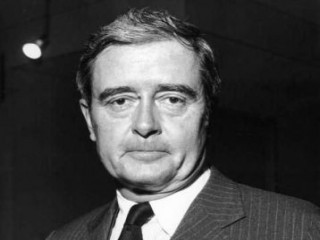
Kingman Brewster Jr. biography
Date of birth : 1919-06-17
Date of death : 1988-11-08
Birthplace : Longmeadow, Massachusetts, U.S.
Nationality : American
Category : Famous Figures
Last modified : 2011-09-05
Credited as : educator, president of Yale University,
Kingman Brewster, Jr. served as president of Yale University from 1963 to 1977, greatly broadening the base of that university's student body and strengthening Yale's ties to the community. He then served as ambassador to Great Britain for four years.
Kingman Brewster, Jr., was born June 17, 1919, in Longmeadow, Massachusetts, to Kingman Brewster and Florence Besse Brewster, descendants of one of the state's first families. Following graduation from Belmont High School, Brewster entered Yale in 1937 and graduated with an A.B. in 1941. As a student he was an isolationist and a supporter of "America First" and once invited Charles Lindburgh to speak on campus. In 1942 he married Mary Louise Phillips. The couple had three boys and two girls. During World War II he served as a Navy fighter pilot and was discharge a lieutenant in 1946. He then entered Harvard Law School, receiving his law degree in 1948. During the next two years he served as legal counsel for the Marshall Plan in Europe and as a research associate in economics at the Massachusetts Institute of Technology. In 1950 he became an assistant professor of law at Harvard, specializing in antitrust and international law, and a full professor in 1953. He remained at the school the ten years until he was appointed provost at Yale University in 1960.
In 1963 the governing board of Yale elected Brewster president. A leadership controversy developed even prior to his presidency when, as acting president, he denied Governor George C. Wallace a campus speaking engagement shortly after the bombing of an African American church in Birmingham, Alabama. Opponents decried the "denial of freedom of speech, " while Brewster justified his decision as heading off possible inflamation of the African American community. The 1960s were difficult times for university administrators and especially for someone like Brewster who openly sympathized with the anti-Vietnam War movement and with the African American civil rights activists.
Brewster's tenure as president was marked by widespread popularity among students, faculty, and alumni. His reputation as a "good listener" and his approachability assisted him in weathering controversies. This was particularly evident in the student strike in protest of the New Haven trial of Black Panther Bobby Seale. He not only rallied faculty forgiveness for the educational interruption and the support of the Yale Corporation, but publicly stated that he was "skeptical of the ability of black revolutionaries to achieve a fair trial anywhere in the United States." Vice President Spiro Agnew accused the Yale president of lacking maturity and responsibility and called for alumni to demand that Brewster go.
Brewster's primary accomplishments as president of Yale University were the broadening of the base of the student body, admitting women (1969), dropping Reserve Officers Training Corps (R.O.T.C.), and fostering a new partnership between the traditionally staid administration and the student body. During this time the percentage of students who were children of alumni dropped from 30 to 15. The number of public high school graduates entering Yale grew to outnumber the private high school graduates who entered by a ratio of two to one. His critics accused him of not sharing decision-making, yet he met problems head-on, making him extremely vulnerable to personal attack and thus shielding the university. During the 1960s, Brewster also served as an advisor on several Presidential Committees. From 1965 to 1967 he served on the President's Commission on Law Enforcement and Administration of Justice. From 1965 to 1968 he served on the President's Commission on Selective Service.
In 1977 Brewster left his position at Yale when Secretary of State Cyrus Vance, a member of the Yale Corporation, recommended Brewster to President Carter for the post of ambassador to Great Britain. Despite his lack of diplomatic experience, the British press was pleased with the appointment, calling Brewster potentially the best ambassador since David Bruce. They described him as "New England Patrician" and expressed delight at his gold ring with his family motto in Norman French.
Ambassador Brewster wasted no time in beginning his new responsibilities. He was called to step in and resolve difficulties between United Nations Ambassador Andrew Young and the British Foreign Office. This was followed by smoothing out American/British difficulties over policy toward Rhodesia (Zimbabwe), which helped lead to the end of minority white rule in that country. He reveled in the "good life" of London opportunity and took advantage of the range of social occasions from dinner with Queen Elizabeth to quaffing a pint of ale in a working class pub, saying, "Becoming aware of the richness and variety here is a lot of fun."
After four years Kingman Brewster resigned the ambassadorship and returned to New Haven to live in his home just a block from the Yale campus. He took a part-time position with a New York law firm and devoted the rest of his time to writing a book on what he called the "Volunteer Society", which was never published. In 1986 he became Master of University College at Oxford University, and remained at Oxford until his death in 1988. On November 8, 1988, Brewster died of a cerebral hemorrhage.
Numerous institutions conferred honorary degrees upon Brewster, and he received several awards, including the Award of Excellence in Human Relations from the New York Council of Churches in 1970. He was made an officer in the Legion of Honor in 1977. In 1997 Brewster was honored with an exhibit at Yale's Sterling Memorial Library, Innovation and Diversification: Yale during the Kingman Brewster Jr. Presidency, 1963 to 1977.
















